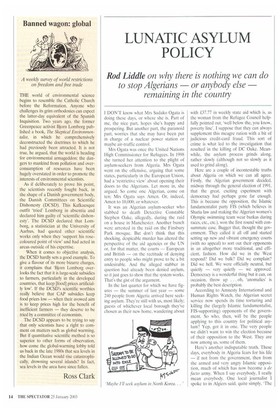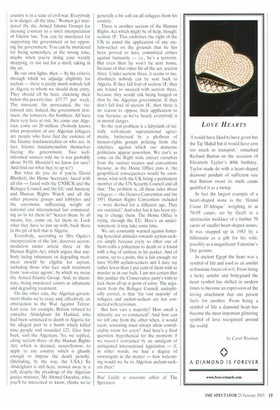LUNATIC ASYLUM POLICY
Rod Liddle on why there is nothing we can do
to stop Algerians — or anybody else — remaining in the country
I DON'T know what Mrs Sadako Ogata is doing these days, or where she is. Part of me, the nice part, hopes she's happy and prospering. But another part, the paranoid part, worries that she may have been put in charge of a nuclear power station or maybe air-traffic control.
Mrs Ogata was once the United Nations High Commissioner for Refugees. In 1998 she turned her attention to the plight of asylum-seekers from Algeria. Mrs Ogata went on the offensive, arguing that some states, particularly in the European Union, had a 'restrictive view' about opening their doors to the Algerians. Let more in, she argued. So come one Algerian, come on ten: Mrs Ogata says Amen. Or. indeed, Amen to 10,000; or whatever.
It was an Algerian asylum-seeker who stabbed to death Detective Constable Stephen Oake, allegedly, during the raid on a house in Manchester. Another bunch were arrested in the raid on the Finsbury Park mosque. But don't think that this shocking, despicable murder has altered the perspective of the aid agencies or the UN or, for that matter, the courts — European and British — on the rectitude of denying entry to people who might prove to be a bit undesirable. And the alleged stabber in question had already been denied asylum, so it just goes to show that the system works. That's the gist of the argument.
In the last quarter for which we have figures — the summer of last year — some 240 people from Algeria arrived here seeking asylum. They're still with us, most likely; guests of whichever local borough they've chosen as their new home, wandering about with £37.77 in weekly state aid which is, as the woman from the Refugee Council helpfully pointed out, 'well below the, you know, poverty line'. I suppose that they can always supplement this meagre ration with a bit of judicious credit-card fraud_ This sort of crime is what led to the investigation that resulted in the killing of DC Oake. Meanwhile, the asylum process grinds along, rather slowly (although not so slowly as it used to grind along).
Here are a couple of incontestable truths about Algeria on which we can all agree. Firstly, the Algerian government decided, midway through the general election of 1991, that the great, exciting experiment with democracy had perhaps gone far enough. This is because the opposition, the Islamic fundamentalist party FIS (which believes in Sharia law and making the Algerian women's Olympic swimming team wear burkas during races, etc., etc.), won the first round with consummate ease. Bugger that, thought the government. They called it all off and started setting up new and vibrant emergency courts (with no appeal) to sort out their opponents in an altogether more traditional, and efficient, fashion. How did we in the West respond? Did We balk? Did we complain? Did we hell. We were officially neutral, but quietly — very quietly — we approved. Democracy is a wonderful thing but it can, on
occasion, throw up oh, 'anomalies' is probably the best description.
According to Amnesty International and Human Rights Watch, the Algerian secret service now spends its time torturing and killing the (largely Islamic fundamentalist, FIS-supporting) opponents of the government. So who, then, will be the people applying to this country for political asylum? Yep, got it in one The very people we didn't want to win the election because of their opposition to the West. They are now among us, some of them.
Here's another indisputable truth. These days, everybody in Algeria fears for his life — if not from the government, then from the armed and very angry Islamic opposition, much of which has now become a de facto army. When I say everybody, I really mean everybody. One local journalist I spoke to in Algiers said, quite simply, 'The country is in a state of civil war. Everybody is in danger, all the time.' Women get murdered (by the Armed Islamic Group) for dressing contrary to a strict interpretation of Islamic law. You can be murdered for supporting the government or for opposing the government, You can be murdered for being somewhere at the wrong time, maybe when you're doing your weekly shopping, or are out for a stroll, taking in the air.
By our own lights, then — by the criteria through which we adjudge eligibility for asylum — there is pretty much nobody left in Algeria to whom we should deny entry. They should all be here, clutching their below-the-poverty-line /37.77 per week. The innocent, the persecuted, the victimised and, indeed, the government ministers, the torturers, the bombers. All have their very lives at risk, So, come one Algerian, come on 20 million. (Nobody knows what proportion of our Algerian refugees are people who have fled the violence of the Islamic fundamentalists or who are, in fact. Islamic fundamentalists themselves fleeing the government. Two wellinformed sources told me it was probably about 50/50. Shouldn't we know for sure? And find out what they're up to?) But what do you do if you're David Blunkett, the Home Secretary, faced with all this — faced with the UNHCR and the Refugee Council and the EU and Amnesty and Human Rights Watch and all the other pressure groups and lobbyists and the enormous, suffocating weight of national and international law commanding us to let them in? Screen them, by all means, but, come on, let them in. Look what they have to put up with, back there in the pit of hell that is Algeria.
Everybody, according to Mrs Ogata's interpretation of the law, deserves accommodation under article three of the Human Rights Act, which argues that anybody facing inhumane or degrading treatment should be eligible for asylum, including those who face such treatment from 'non-state agents', by which we mean the Armed Islamic Group. And, to illuminate, being murdered counts as inhumane and degrading treatment.
On the other side, the Algerian government thinks we're crazy and, effectively, an obstruction in the War Against Terror. Last year, for example, Britain refused to extradite Abdelghani Ait Haddad, who had been sentenced to death in Algeria for his alleged part in a bomb which killed nine people and wounded 123. Give him back, said the Algerians. No, we replied, citing section three of the Human Rights Act, which is deemed, natureltement, to apply to any country which is ghastly enough to impose the death penalty. (Including, by the way, the USA.) So Abdelghani is still here, stowed away in a cell, despite the pleadings of the Algerian justice minister, Mr Ahmed Ouyabia, who, you'll be interested to know, thinks we're generally a bit soft on all refugees from his country.
There is another section of the Human Rights Act which might be of help, though: section 1F. This enshrines the right of the UK to annul the application of any asylum-seeker on the grounds that he has been proved to have committed crimes against htimanity — i.e., he's a terrorist. But even then be won't be sent home, because of that other bit of the act, section three. Under section three, it seems to me, absolutely nobody can be sent back to Algeria. If they fall foul of section 1F, they are bound to succeed with section three, because they would risk being hanged or shot by the Algerian government. If they don't fall foul of section 1F, then there is no reason to oppose their application to stay because, as we've heard, everybody is in mortal danger.
So the real problem is a labyrinth of initially well-meant supranational agreements, buttressed by a plethora of human-rights groups policing from the sidelines, against which our domestic politicians appear powerless. We can't, as some on the Right wish, extract ourselves from the various treaties and conventions because, as the Home Office puts it, the geopolitical consequences would be enormous, what with the UK being a permanent member of the UN Security Council and all that: 'The problem is, all these rules about refugees — the Geneva Convention and the 1951 Human Rights Convention included were devised for a different age. They are outdated.' And what fun it has been trying to change them. The Home Office is trying, through the EU. Here's an understatement: it may take some time.
We are constantly warned against fostering hysterical attitudes towards asylum-seekers simply because every so often one of them stabs a policeman to death or is found with a bag of anthrax in his pocket. And of course, up to a point, this is fair enough: we have 90,000 asylum-seekers and I dare say rather fewer than l per cent of them wish to murder us in our beds. I am not certain that this justifies the Conservative party's wish to lock them all up at point of entry. The argument from the Refugee Council, undoubtedly: correct, is that 'the vast majority' of refugees and asylum-seekers are not connected with terrorism.
But how vast a majority? How small a minority are so connected? And how can we tell one from the other when, it would seem, screening must always allow considerable room for error? And here's a final question, hypothetical for the moment: if we weren't restrained by an amalgam of antiquated international legislation — if, in other words, we had a degree of sovereignty in the matter — how welcoming would we be to Algerian asylum-seekers then?
Rod Liddle is associate editor of The Spectator.



















































































 Previous page
Previous page